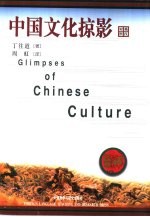

中国文化掠影PDF电子书下载
- 电子书积分:11 积分如何计算积分?
- 作 者:丁往道著;周虹译
- 出 版 社:北京:外语教学与研究出版社
- 出版年份:2001
- ISBN:7560020259
- 页数:296 页
1 Beginnings of Chinese Culture 2
Huang Di and Yu 2
—The Shang and the oracle bones 4
—The Zhou and the fief system 6
—The Spring and Autumn and the Warring States periods 8
2 Confucius 14
His life 14
—The Analects 18
—Moral principles 18
—Humane government 20
—The rigth way to live and behave 24
—Principles of education and teaching methods 24
—Confucianism made the state thought 28
3 Lao Zi and Taoism 30
Lao Zi s life 30
—The Dao De Jing 30
—The meaning of Dao 32
—Reversion is the movement of Dao 34
—Nonaction as the way of government 36
—Taoism and Confucianism compared 38
—Lao Zi s influence 40
Mo Zi 44
4 The Contention of A Hundred Schools 46
—Mencius 46
—Zhuang Zi 48
—Han Fei 52
5 Ancient Historians 58
Early official historians 58
—The Spring and Autumn Annals 60
—Sima Qian 62
—Ban Gu 64
6 Dong Zhongshu and Wang Chong 68
The unification of China by the Qin 68
—The founding of the Han 70
—Dong Zhongshu 70
—The interaction between Heaven and man 72
Wang Chong 74
—His criticism of Dong Zhongshu 76
7 The Coming of Buddhism 80
Life of Sakyamuni 80
—Cause and effect 82
—The four noble truths 84
—The coming of Buddhism to Chian 88
The Southern and Northern Dynasties 90
8 Pure Talk and Mysterious Learning 90
—Pure Talk 94
—Mysterious Learning 94
—The Taoist religion 94
9 Chan(Zen)Buddhism 98
Chinese Buddhism 98
—The beginning of Chan Buddhism 98
—Huineng 100
—Chan principles 106
The Sui and the Tang 108
10 Tang Poetry 108
—Early Chinese poetry 110
—The golden age of Chinese poetry 112
—Li Bai 114
—Du Fu 116
—Bai Juyi 118
11 Tang prose and Fiction 122
Prose before the tang 122
—Han Yu and Liu Zongyuan 124
—Beginnings of fiction 126
—The rise of chuanqi or short stories 128
12 Wang Anshi, Sima Guang and Su Shi 132
From the Tang to the Song 132
—Wang Anshi 136
—Sima Guang 140
—Su Shi 142
13 The Philosophy of Principle 146
New philosophical questions discussed in the Song 146
—His philosophy 148
—Zhu Xi 148
14 Ci-Poems in Irregular Meter 154
The beginning of ci 154
—Li Yu 154
—Liu Yong 156
—Su Shi 156
—Li Qingzhao 158
—Lu You 160
—Xin Qiji 162
—Paper 166
15 The Four Great Inventions 166
The compass 166
—Gunpowder 168
—Printing 170
—The rise of the Mongols 172
—The founding of the Yuan 174
16 Yuna Drama 176
Sanqu and zaju 176
—Guan Hanqing and The Injustice Suffered by Dou E 178
—The development of Drama 178
—Wang Shifu and Romance of the Western Chamber 182
—Ji Junxiang and The Orphan of the Zhao Family 184
17 The Rebuilding of Beijing and Zheng He s Voyages 188
The founding of the Ming 188
—Beijing made the capital of the country 190
—The rebuilding of Beijing 190
—Zheng He s voyages 192
—Seeds of capitalism 194
Novels written in the spoken language 198
18 Ming Novels 198
—Romance of the Three Kingdoms 200
—Water Margin 204
—Journey to the West 206
19 Ming Drama and Short Fiction 210
Northern Drama and Southern Drama 210
—Tang Xianzu and The Peony Pavilion 212
—Three Volumes of Words 214
—The development of short fiction 214
20 Ming and Early Qing Thinkers 220
Wang Shouren 220
—The fall of the Ming and the founding of the Qing 222
—Matteo Ricci 228
—Huang Zongxi 228
—Gu Yanwu 232
—Wang Fuzhi 234
21 Early Qing Fiction and Drama 240
Strange Tales from a Scholar s Studio 242
—Palace of Eternal Life 244
—The Peach Blossom Fan 246
—The Scholars 248
22 Dream of the Red Mansions 252
Cao Xueqin s life 252
—Baoyu and Daiyu 254
—Society revealed in the novel 254
—The language of the novel 256
— Red Studies 258
23 Painting 260
Ancient painting 260
—Buddhist painting and Dunhuang grottoes 262
—Landscape painting 262
—Literary men s painting 264
—Formats 266
—Inscriptions and seals 268
The Opium War 270
24 The Opium War and Changes in Cultural Trends After It 270
—The Treaty of Nanjing 272
—Advanced ideas of some scholars 274
—The westernization drive 274
—The reformists 276
—The failure of reform 278
25 Why China s Feudal Period Was So Long 282
A natural economy 282
—A stable feudal political system 284
—A highly-developed feudal culture 286
- 《东北民歌文化研究及艺术探析》(中国)杨清波 2019
- 《大学英语教学的跨文化交际视角研究与创新发展》许丽云,刘枫,尚利明著 2020
- 《跨文化交际背景下的中西文化比较研究》任永进,贺志涛著 2019
- 《生态文化建设的社会机制研究》阮晓莺著 2019
- 《党内政治文化建设指南》苏玉主编 2017
- 《白纻舞及其歌辞的文化解读》王俊,曹化根著 2019
- 《社会文化系统中的翻译》姜秋霞,杨正军 2019
- 《中国经典文化走向世界丛书 学术卷 2》龚海燕译 2019
- 《新世纪的文化思考》方克立著 2019
- 《媒介融合背景下的红色文化大众化研究》张文 2019
- 《李绅及其诗歌研究》严正道著 2019
- 《社交故事新编 教会孤独症谱系障碍人士日常社会技能的185个社交故事》(美)卡罗尔·格雷(CarolGray)著;鲁志坚,王漪虹译 2019
- 《老年饮食防癌与治癌》洪云霞,周虹编著 1996
- 《陈望道全集》陈望道著;池昌海主编 2011
- 《C语言程序设计实用实践教程》周虹,葛茂松,苏晓光主编 2013
- 《中国现代经济伦理建设研究》崔宜明,强以华,任重道著 2013
- 《数控编程与仿真实训 第3版》周虹,董小金,张克昌主编 2012
- 《预言姐妹 3 火焰之环》(美国)米歇尔·辛克著;董宇虹译 2013
- 《缠来禅去》释心道著;尤传贤绘图 2009
- 《司铎退省 上》谈天道著;邹俊生译 1950
